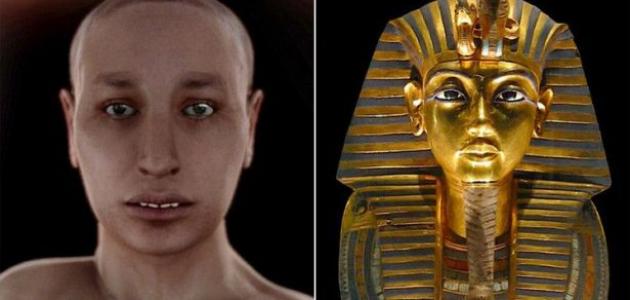The mysterious pharaoh king

Tutankhamun
Tutankhamun is one of the ancient Egyptian pharaohs of the 18th Dynasty. He is the son of King Akhenaten who ruled Egypt for seventeen years and the son of Queen Nefertiti, who was famous for its beauty. Tutankhamun is one of the most famous pharaohs of the time, for reasons not related to his achievements and heroines. , But about the mysterious circumstances surrounding the causes of his death at a young age, and because of the discovery of his tomb and treasures, complete without any damage. During his reign, Tutankhamun took a small reign at the age of nine. One of the most important events during his reign was the revolution that took place in Tel Amarna against the decisions taken by his father Akhenaten before his death. He moved the capital from Taibah to Attoun's sister in Minya and his attempt to unify the gods of Egypt Who was baptized into the form of one god, Athen. After three years of his reign, Tutankhamun abolished the decision to unify the gods and lift the ban on worshiping different
gods.
Death?!
is still the cause of the death of Tutankhamun early unknown and mysterious and multiple theories on this matter, where it was thought that the cause of his death is the assassination of his minister Khakhbero Rai, and was the reason for this belief is his marriage to the widow of the Pharaoh after his death and his rule for a short time, A fracture of his right thigh bone and a hole in his skull that may indicate he received a blow to the head, while studies and 3D imaging suggested that the cause of his death may be for his fracture of the leg bone and inflammation and thus his death. Recent studies conducted on Tutankhamun showed that he was short in height and not more than 70 cm long, and that the size of his skull was much larger than normal, indicating that he may have Marfan's genetic syndrome that may cause premature death. The cause of his death may be the result of exposure to poisoning in the blood resulting from the fracture of the bone of the leg, which in turn leads to the incidence of Cancers, which means the death of cells of the body and decomposition. The latest studies showed that he was likely to die from malaria, which was widespread in the past. Studies also showed that he had a number of genetic diseases as a result of genetic defect. The tomb of Tutankhamun was discovered accidentally in the Valley of the Kings when British historian Howard Carter, the archaeologist specializing in Egypt, observed a large vault while excavating the tomb of Ramesses VI. He began excavating until he reached the tomb of Tutankhamun, To be the first person to enter the tomb room